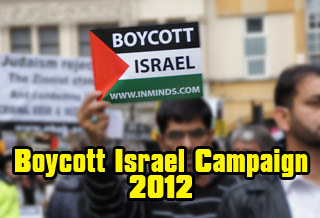|
[Boycott - Economy and Trade News] Europe's highest court rejects preferential EU treatment for products made in Israeli-occupied Palestinian territory
Christopher Lund , The Daily Star
18 March 2010 On February 25, 2010 the European Court of Justice (ECJ) handed down a judgment in Brita GmbH v. Hauptzollamt Hamburg-Hafen. The facts of the case are nothing spectacular, but it is the politically-charged nature of the case and the economic consequences of the ruling that make this case significant.

The EU is Israelâs second largest exporting partner. In 2008, Israeli companies exported about $16.2 billion in goods to the EU. An estimated one-third of these goods were either fully or partially made in the occupied territories. 
One of the issues that the ECJ was asked to determine was whether goods produced by an Israeli manufacturer in the West Bank qualify for preferential treatment under the 1995 EC-Israel Agreement. The Agreement basically states that goods produced in the âterritory of Israelâ shall enjoy preferential treatment, in the form of reduced tariffs, when exporting to EU member states. The ECJ has now ruled that Israeli products from the West Bank (or any other administrative territory of Israel) do not so qualify.
The ruling comes as no surprise to anyone in the EU who has been following the growing vocal disapproval over Israeli labeling practices. For example, on November 11, 2009 the UK government made an official recommendation to make it a criminal offense to label any products from Israeli settlements as having been produced in Israel.
Part of the reason for EU displeasure over Israelâs characterization of West Bank goods is that the EU is the largest aid giver to the Palestinian Authority (PA). For the last several years the EU has given an average of over $600 million per year in aid to the Palestinians. In the view of many EU members, whenever Israel uses lands, such as the West Bank, and profits from them, Israel is diverting funds from the Palestinian economy. As a result, the PA requires more external aid. While Israel is getting richer on Palestinian soil, the EU must bear the cost by giving more aid to the Palestinians.
So when Brita, a German company that imports drink makers from an Israeli supplier, applied for preferential treatment under the EC-Israel Agreement, German customs officials wanted to make sure that the goods originated in Israel and not just in Israeli-occupied territory. German customs then sent an inquiry to Israel and received a response that the goods were manufactured in an area under Israelâs responsibility. Germany then sent a more specific request, asking where the goods were manufactured; however, Israel did not respond.
This is not the first time that Israel has been accused of skirting EU rules under the EC-Israel Agreement. For many years, Israel had been known to import Brazilian orange juice, re-label it as being made in Israel, and then ship it to the EU duty free. Subtler has been the Israeli practice of labeling products from its settlements as coming from Israel. For example, Yarden Wine, made in Golan Heights, describes its product as âproduce of Israel.â
Due to this and other questionable practices, in February 2005 the EU began requiring that all goods from Israel âbe marked with their place of origin and postcode.â The goal of these labeling requirements was not only to prevent Israel from importing goods from other nations and relabeling them as âmade in Israel;â but also to prevent Israel from doing the same thing to goods manufactured in the West Bank, East Jerusalem, Golan Heights, and other Israeli settlements.
In Israelâs defense, the language of the EC-Israel Agreement is not straightforward. Critics have characterized Israelâs labeling practices of settlement goods as âa clear violationâ or âblatant violationâ of the EC-Israel Agreement. However, nowhere in the agreement do the parties define the âterritory of the State of Israel.â Article 83 of the Agreement simply states: âThis Agreement shall apply, on the one hand, to the territories in which the Treaties establishing the European Community ⦠and, on the other hand, to the territory of the State of Israel.â
Israelâs interpretation was that the areas under Israeli control since 1967, such as parts of the West Bank, are the territory of the state of Israel insofar as Israel has administered these lands, set up Israeli businesses, housing settlements, maintained military control, and (to a great extent) continues to control the economic and physical movement of people in the area.
So why did Israel not use this case as an opportunity to officially and openly make the argument that Israeli settlements are part of âthe territory of Israel?â Or why did Israel not respond to Germanyâs second request for more information about the origin of Britaâs products? Perhaps Israeli officials saw that the game was up after Germanyâs dissatisfaction with its first response of, â[o]ur verification has proven that the goods in question originate in an area that is under Israeli Customs responsibility.â
Israel realized that Germany did not accept its expansive view of Israeli territory, that most EU members have called Israelâs maintaining of settlements illegal, and that if it responded to Germanyâs second request, Britaâs goods would definitely not be given preferential treatment. Yet, if Israel ignored the request, there is an off chance that preferential treatment would still be granted without incurring a clear ruling pointing to occupation.
Still, the importance of the recent ECJ ruling is to finally define âthe territory of Israelâ as it pertains to the EC-Israel Agreement. In doing so the ECJ has rejected Israelâs interpretation of what constitutes Israeli territory: âThe EU takes the view that products obtained in locations which have been placed under Israeli administration since 1967 do not qualify for the preferential treatment provided for under that agreement.â
Defining the extent of Israeli territory was only the answer to the first question.
Brita put before the court a second argument, namely that even if Israeli goods from the West Bank do not qualify under the EC-Israel Agreement, the goods should still qualify for EU preferential treatment under the EC-PLO Association Agreement. In other words, since both Israel and PA have Association Agreements with the EU, then it doesnât matter if goods are produced by Israelis or Palestinians in the West Bank â the goods should still qualify for preferential treatment.
In answering the second issue, the ECJ referred to the Vienna Convention, an international agreement on customary international law concerning treaties between states. Article 34 of the Convention provides: âA treaty does not create either obligations or rights for a third State without its consent.â
In accordance with Article 34, the ECJ determined that Israel cannot use the EU-PLO Agreement to gain the right to export goods from the West Bank to the EU duty-free; because that would be tantamount to obligating the PA to confer rights over Palestinian territory to Israel. âSuch an interpretation, the effect of which would be to create an obligation for a third party without its consent, would thus be contrary to the principle of general international law â¦â
The ECJ further determined that an importing EU state cannot grant preferential treatment to all goods from the West Bank by ignoring the manufacturerâs nationality.
âTo allow elective determinationâ would be âtantamount to denyingâ that the exporting State must âprovide valid proof of origin.â
In ruling the way it did, the ECJ was sensitive to volatile Palestinian-Israeli relations. The last thing the Mediterranean area needed was for an international power to legitimize Israelâs occupation of Palestinian lands. Critics already point to Israeli occupation of the West Bank and other settlements as the biggest barrier to peace in the area. Adding an EU stamp of legitimacy on âmade in Israelâ goods from the West Bank would have caused greater resentment among Palestinians and more fuel to an already unstable situation.
The effect of the ECJâs ruling has large political and monetary ramifications for Israel. For example, just before the ruling, Palestinian leader Mahmoud Abbas was in Brussels and urged Europeans ânot to investâ in Israeli settlements and to âboycott productsâ from them. Now with the ECJâs ruling, the Palestinianâs arguments will carry much more weight. Israel has yet to comment on the decision; however, it sent a clear message to Palestinians this past week by announcing the construction of 1,600 Israeli housing units in East Jerusalem.
Also consider that the EU is Israelâs second largest exporting partner. In 2008, Israeli companies exported about $16.2 billion in goods to the EU. One source indicates, âAn estimated one-third of these goods were either fully or partially made in the occupied territories.â The ECJ ruling means a price increase for one-third of Israeli products in the EU, making them less competitive. This may force Israel to rethink the extent to which it relies on settlement operations as part of its national economic strategy.
Christopher Lund, who also edited the ECJ decision on THE DAILY STAR law page, is a second-year law student at the University of Utah College of Law. He has a BA in Political Science and a BA in Russian Language from the University of Alaska Anchorage.
Source: http://www.dailystar.com.lb/article.asp?edition_id=10&categ_id=30&article_id=112849
Court of Justice of the European Union:
Case C-386/08 Brita GmbH v Hauptzollamt Hamburg-Hafen, 25 February 2010
The Daily Star
18 March 2010
Summary
The ECJ held that 1) The customs authorities of the importing member state may refuse to grant the preferential treatment provided for under the EC-Israel Association Agreement where the goods concerned originate in the West Bank; 2) The customs authorities of the importing member state may not grant preferential treatment by leaving the question open as to which agreement is to be taken into account â namely, the EC-Israel Association Agreement and the EC-PLO Association Agreement; 3) Customs authorities of the importing state are not bound by the proof of origin submitted or by the reply given by the customs authorities of the exporting state where that reply does not contain sufficient information, for the purposes of Article 32(6) of the EC-Israel Protocol, to enable the real origin of the products to be determined; 4) Customs authorities of the importing state are not obliged to refer to the Customs Cooperation Committee set up under Article 39 of that protocol a dispute concerning the territorial scope of the EC-Israel Association Agreement.
Facts
The case concerns a customs dispute between Brita GmbH (âBritaâ), a company incorporated under German law, and the Hauptzollamt Hamburg-Hafen a German customs office concerning the refusal of the Hauptzollamt to grant Brita preferential treatment with regard to the importation of products manufactured in the West Bank.
Brita imports drink-makers for sparkling water, as well as accessories and syrups, all produced by an Israeli supplier, Soda-Club Ltd., at a manufacturing site at Mishor Adumin in the West Bank, to the east of Jerusalem. In 2002 Brita imported some products into Germany. It stated that the country of origin for those goods was âIsraelâ and sought the application of the preferential tariff provided for under the EC-Israel Association Agreement on the basis of invoice declarations made out by the supplier confirming that the products concerned originated in Israel.
The German customs authorities sought further verification. The Israeli customs authorities replied that âour verification has proven that the goods in question originate in an area that is under Israeli Customs responsibility. As such, they are originating products pursuant to the EC-Israel Association Agreement and are entitled to preferential treatment under that agreement.â
In 2003, the German customs authorities asked the Israeli customs authorities to indicate ⦠whether the goods in question had been manufactured in Israeli-occupied settlements in the West Bank, the Gaza Strip, East Jerusalem or the Golan Heights. That letter remained unanswered. Germany subsequently refused preferential treatment.
Issues
1. Whether the customs authorities of the importing member state may refuse to grant the preferential treatment provided for under the EC-Israel Association Agreement where the goods at issue originate in the West Bank.
2. Whether customs authorities are free to choose between two substantively equivalent possibilities, leaving open the questions of [1] which of the two agreements applies EC-Israel or EC-PLO Agreement, and [2] of whether proof of origin falls to be issued by the Israeli authorities or by the Palestinian authorities.
3. Whether, for the purposes of the procedure laid down in Article 32 of the EC-Israel Protocol, the customs authorities of the importing state are bound by the proof of origin that is submitted and by the reply given by the customs authorities of the exporting state.
4. Whether, in order to settle a dispute that has arisen in relation to the verification of invoice declarations, the customs authorities of the importing state must, pursuant to Article 33 of the protocol, submit that dispute to the Customs Cooperation Committee before adopting measures unilaterally.
Decision:
Israeli-occupied settlements not part of agreement
The aim of Germanyâs subsequent verification was to establish the precise place of manufacture of the imported products, for the purposes of determining whether those products fell within the territorial scope of the EC-Israel Association Agreement. The European Union takes the view that products obtained in locations which have been placed under Israeli administration since 1967 do not qualify for the preferential treatment provided for under that agreement.
Israeli goods from West Bank
The customs authorities of the importing member state may refuse to grant the preferential treatment provided for under the EC-Israel Association Agreement where the goods concerned originate in the West Bank.
Under Article 83 thereof, the EC-Israel Association Agreement applies to the âterritory of the State of Israel.â Under Article 73 thereof, the EC-PLO Association Agreement applies to the âterritories of the West Bank and the Gaza Strip.â
One of the relevant rules is the general international law principle of the relative effect of treaties, according to which treaties do not impose any obligations, or confer any rights, on third States (âpacta tertiis nec nocent nec prosuntâ). That principle of general international law finds particular expression in Article 34 of the Vienna Convention, under which a treaty does not create either obligations or rights for a third state without its consent.
Accordingly, to interpret Article 83 of the EC-Israel Association Agreement as meaning that the Israeli customs authorities enjoy competence in respect of products originating in the West Bank would be tantamount to imposing on the Palestinian customs authorities an obligation to refrain from exercising the competence conferred upon them by virtue of the abovementioned provisions of the EC-PLO Protocol. Such an interpretation, the effect of which would be to create an obligation for a third party without its consent, would thus be contrary to the principle of general international law.
No âelective determinationâ
The customs authorities of the importing member state may not make an elective determination, leaving open the questions of [1]which of the agreements to be taken into account â namely, the EC-Israel Association Agreement and the EC-PLO Association Agreement â applies in the circumstances of the case and [2] of whether proof of origin falls to be issued by the Israeli authorities or by the Palestinian authorities.
To allow elective determination simply because both the agreements at issue provide for preferential treatment and because the place of origin of the goods is established by evidence other than that envisaged under the association agreement that is actually applicable would be tantamount to denying, generally, that, in order to be entitled to the preferential treatment, it is necessary to provide valid proof of origin issued by the competent authority of the exporting state.
It is clear, both from Article 17 of the EC-Israel Protocol and from Article 15 of the EC-PLO Protocol, that the requirement of valid proof of origin issued by the competent authority cannot be considered to be a mere formality that may be overlooked as long as the place of origin is established by means of other evidence.
Verifying proof of origin
For the purposes of the procedure laid down in Article 32 of the EC-Israel Protocol, the customs authorities of the importing state are not bound by the proof of origin submitted or by the reply given by the customs authorities of the exporting state where that reply does not contain sufficient information, for the purposes of Article 32(6) of the EC-Israel Protocol, to enable the real origin of the products to be determined.
It is clear from Article 32 of the EC-Israel Protocol that the subsequent verification of invoice declarations is carried out whenever the customs authorities of the importing state have reasonable doubt as to the authenticity of such documents or the originating status of the products concerned ⦠If, in cases of reasonable doubt, there is no reply within 10 months or if the reply does not contain sufficient information to enable the authenticity of the invoice declarations or the real origin of the products to be determined, the customs authorities of the importing state are to refuse to grant the preferential treatment.
The letter of 6 February 2003 from the German customs authorities to verify whether Britaâs products came from the West Bank remained unanswered. In circumstances such as those, it must be held that a reply such as that given by the customs authorities of the exporting State does not contain sufficient information â¦
In accordance with Article 32(6) of the EC-Israel Protocol, if the reply given by the customs authorities of the exporting state does not contain sufficient information to enable the real origin of the products to be determined, the requesting customs authorities are to refuse to grant preferential treatment in respect of those products.
Dispute referrals
Customs authorities of the importing state are not obliged to refer to the Customs Cooperation Committee set up under Article 39 of that protocol a dispute concerning the territorial scope of the EC-Israel Association Agreement.
Under Article 39 of the EC-Israel Protocol, the Customs Cooperation Committee is an administrative body composed of customs experts and officials from the Commission. It is to be entrusted with the performance of any technical task in the customs field. Consequently, it cannot be regarded as having competence to settle disputes concerning questions of law such as those relating to the interpretation of the EC-Israel Association Agreement itself.
Source: http://www.dailystar.com.lb/article.asp?edition_id=10&categ_id=30&article_id=112850
BNC welcomes landmark EU court ruling, calls for intensifying grassroots BDS
The Boycott, Divestment and Sanctions Campaign National Committee
15 March 2010
Palestine- 15 March: The Boycott, Divestment and Sanctions Campaign National Committee (BNC) welcomes the long overdue ruling by the Court of Justice of the European Union that Israeli products originating from Israel's colonial settlements built on Occupied Palestinian Territory (OPT) do not qualify for preferential customs treatment under the EC-Israel trade agreement.
According to the Fourth Geneva Convention, all Israeli colonies are illegal and constitute war crimes. The BNC calls on all 27 member states of the European Union to implement the court's findings in full and without delay, as a first step towards a full ban on Israeli colonies' products. We also urge the citizens and civil society groups of European Union member states to pressure their respective governments and the EU leadership to abide by this landmark decision and enforce its implementation.
In response to an appeal lodged by German drinks firm Brita, who were asked to pay full EU import duties when importing supplies manufactured in the OPT by the Israeli company Soda-Club Ltd, Europe's highest court ruled that Israeli products originating in the West Bank do not fall within the territorial scope of the EC-Israel Agreement and therefore do not qualify for preferential treatment under that agreement. The court also ruled that Israeli companies operating in the OPT are "third parties" and cannot benefit from the terms of a separate EC-PLO trade agreement.
Worth â¬12 billion to the Israeli economy, the European Union is Israel's second largest export market after the United States; an estimated one-third of these exports are fully or partially manufactured in Israel's colonies . On top of this, a large number of Israeli companies are providing products and services to the settlements, profiting from them, or rendering them sustainable in other ways. Illegal settlements in the OPT are an integral and significant part of the Israeli economy.
Allowing Israeli goods illegally produced on Palestinian territory to be imported under the terms of an EC-Israel trade agreement effectively constitutes a giant subsidy for Israel's brutal and ever-expanding military occupation and colonization of the West Bank, including East Jerusalem. As with all forms of colonialism, the Israeli occupation is motivated by a combination of political ideology and economic self-interest. This subsidy greatly increases the economic incentive for occupation and is funding the systematic denial of the rights of Palestinians.
Additionally, the BNC would like to highlight the obstructiveness of Israeli export authorities. The court ruling observed that "despite a specific request...they [the firms involved and the Israeli export authorities] did not reply to the question whether the products had been manufactured in Israeli-occupied settlements in Palestinian territory". We call upon member states to hold Israel to what the court described as its obligation to "provide sufficient information to enable the real origin of products to be determined". EU member states should be wary of the likelihood that Israel may react to this ruling by adopting further measures designed to conceal the true origin of many Israeli exports.
In principle, the European Union refuses to recognize Israeli colonies in the Occupied Palestinian Territory as part of the State of Israel. While welcoming this stance, the BNC wishes to remind EU member states that their official position in this regard is undermined by welcoming Israeli products manufactured on Occupied Palestinian Territory into their vast markets. We hope that this new Court of Justice ruling will give member states the confidence and legal basis, assuming they have the will, to impose full import duties on Israeli settlement goods as a precursor to an eventual ban on such illegally produced imports. In fact, upholding international law as well as its own laws would obligate the EU to end its entire Association Agreement with Israel. The EU's lucrative trade with Israel despite its ongoing occupation, colonization and apartheid against the Palestinian people not only violates the human rights clauses in the EC-Israel Association Agreement; it makes a mockery of international law and human rights treaties and indicates complicity in maintaining Israel's system of injustice.
As we await confirmation from the 27 member states of the European Union that they intend to implement the ruling of the EU Court of Justice, the BNC reiterates its call for the suspension of the Trade Association Agreement with Israel and for all forms of civil society-led boycotts and divestment initiatives against Israel until it ends it fully abides by its obligations under international law and respects the rights of the Palestinian people.
Source: http://bdsmovement.net/?q=node/666
Also Of Interest
Page URL: http://inminds.com/article.php?id=10313
|























































